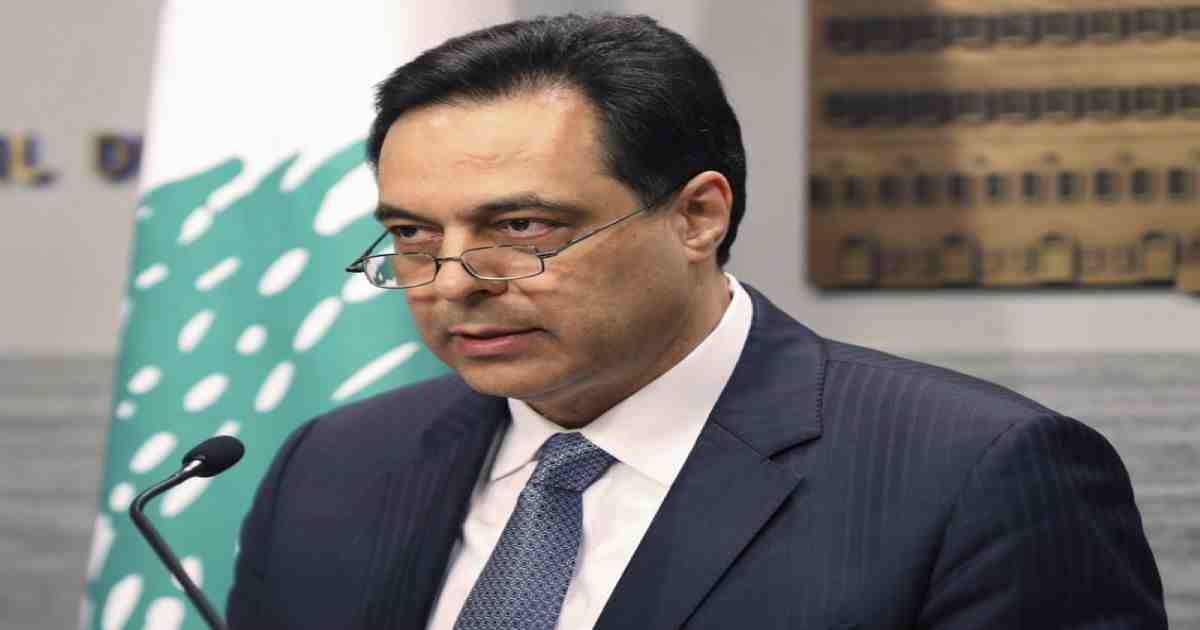Lebanese PM steps down in wake of Beirut protests
- Beirut, AP
- 11 August 2020, 06:04
Lebanon’s prime minister stepped down from amid widespread anti-government protests over Beirut port explosion last week that triggered public fury and mass protests.
In a brief televised speech, Prime Minister Hassan Diab said on Monday that he is taking “a step back” so he can stand with the people “and fight the battle for change alongside them.”
He said, “I declare today the resignation of this government. May God protect Lebanon,” repeating the last phrase three times.
A brief while earlier, Diab's Cabinet resigned. The developments follow a weekend of anti-government protests in the wake of the Aug. 4 explosion in Beirut’s port that caused widespread destruction, killed at least 160 people and injured about 6,000 others.
Diab blamed corrupt politicians who preceded him for the “earthquake” that has hit Lebanon.
“They (political class) should have been ashamed of themselves because their corruption is what has led to this disaster that had been hidden for seven years,” he added.
Prime Minster Hassan Diab headed to the presidential palace to submit the Cabinet’s group resignation, said Health Minister Hamad Hassan. It follows a weekend of anti-government protests in the wake of the Aug. 4 explosion in Beirut's port that caused widestpread destruction, killed at least 160 people and injured about 6,000 others.
The moment typified Lebanon’s political dilemma. Since October, there have been mass demonstrations demanding the departure of the entire sectarian-based leadership over entrenched corruption, incompetence and mismanagement.
But the ruling oligarchy has held onto power for so long — since the end of the civil war in 1990 — that it is difficult to find a credible political figure not tainted by connections to them.
Although Diab’s resignation had appeared inevitable after the catastrophe, he seemed unwilling to leave and only two days ago made a televised speech in which he offered to stay on for two months to allow for various factions to agree on a roadmap for reforms. But the pressure from within his own Cabinet proved to be too much.
Diab’s government was formed after his predecessor, Saad Hariri, stepped down in October in response to the demonstrations. It took months of bickering among the leadership factions before they settled on Diab.
His government, which was supported by Hezbollah and its allies and seen as one-sided, was basically doomed from the start, tasked with meeting demands for reform but made up of all the factions that reformers want out.
Now the process must start again, with Diab’s government in a caretaker role as the same factions debate a new one.
“I hope that the caretaking period will not be long because the country cannot take that. Lets hope a new government will be formed quickly,” Public Works Minister Michel Najjar told reporters. “An effective government is the least we need to get out of this crisis.”
The weekend protests saw clashes with security forces firing tear gas at protesters.
The explosion is believed to have been caused by a fire that ignited a 2,750-ton stockpile of highly volatile ammonium nitrate. The material had been stored at the port since 2013 with few safeguards despite numerous warnings of the danger.
The result was a disaster Lebanese blame squarely on their leadership’s corruption and neglect. Losses from the catastrophic blast are estimated to be between $10 billion to $15 billion, with nearly 300,000 people left homeless.
The last decision taken by Diab’s government before its resignation was to refer the case of the explosion to the Supreme Judicial Council, which handles crimes infringing on Lebanon’s national security as well as political and state security crimes. The Supreme Judicial Council is Lebanon’s top judicial body.
A judge on Monday questioned the heads of the country’s security agencies. Public Prosecutor Ghassan El Khoury questioned Maj. Gen. Tony Saliba, the head of State Security, according to state-run National News Agency. It gave no further details, but other generals are scheduled to be questioned.
About 20 people have been detained after the blast, including the head of Lebanon’s customs department and his predecessor, as well as the head of the port. Dozens of people have been questioned, including two former Cabinet ministers, according to government officials.
Iran, meanwhile, expressed concern that Western countries and their allies might exploit anger over the explosion to pursue their political interests. Iran supports the Hezbollah militant group, which along with its allies dominates the government and parliament.
Iranian Foreign Ministry spokesman Abbas Mousavi said “it is natural for people to be frustrated.” But he said it would be “unacceptable if some individuals, groups and foreign countries use the incident as a pretext for their purposes and intentions.”
Israeli Defense Minister Benny Gantz drew a line Monday between the blast and claims that Hezbollah stores its rockets and weapons deep inside civilian areas.
While he did not accuse Hezbollah and its arms of being linked to the blast, Gantz said villages and towns across Lebanon were packed with Hezbollah arms that, if set off — whether by Israeli operations or by accident — would destroy homes. He said Hezbollah was Lebanon’s biggest problem.


